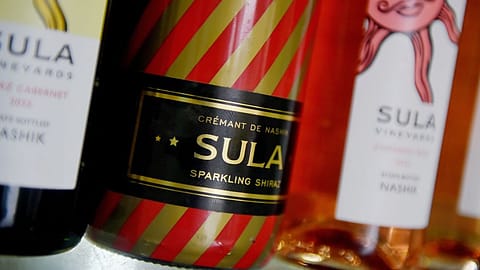Sula Vineyard phasing out low-priced segment; to focus on premiumisation
Karan Vasani, COO, sees the wine segment in India growing on the premiumisation wave

When it comes to the world’s most visited winery, people naturally might think of Napa Valley or France, but nestled in the heart of Maharashtra's wine country lies Sula Vineyards which has redefined the landscape of Indian wine.
“India's thirst for wine knowledge and new experiences is insatiable,” says Karan Vasani, COO, Sula Vineyards, reflecting on the journey of the wine company. “Twenty years ago, if you wanted to visit a vineyard, you would have to travel to Europe. But now, the world's most visited winery is right here in Nasik, in the middle of nowhere.”
Although wine accounts for less than 1% of the alcohol-beverage industry in India, compared to 10% globally, Sula owns 60% of the market share within the country.
With the historic British influence weighing on the population, Indians largely grew up on the notion of whisky and beer. The per capita wine consumption in the country stands at a mere 2-3 spoonfuls annually, in stark contrast to Europe where it reaches a staggering 40 liters per person per year.
However, Vasani sees the wine segment now gradually growing in India based on the premiumisation wave that India is currently riding on. “One thing that wine has going for itself is that it’s aspirational. It’s seen as a lifestyle product. As our country becomes wealthier, and more developed, people want to cultivate a taste for finer things in life,” he says.
In fact, with a significant emphasis on their premium offerings, Sula is steadily but intentionally losing market share in the lower-priced segment which Vasani calls a ‘strategic call’. Their entry-level wine, priced from ₹250 onwards, is crafted from low-quality grapes tailored for a specific brand of consumers. “This segment is already saturated with numerous players, and quality is not a distinguishing factor here. We are letting this aspect of the business go down naturally and we are focusing on what we do best,” he adds.
Wines priced above ₹700 account for approximately 74% of the company's sales, with the remainder, constituting 26%, a decline from the previous sales number of 35%. Sula expects this proportion to continue declining gradually over time.
Recommended Stories
“It will affect our headline revenue number but in terms of profitability, it was never a very lucrative segment to begin with,” Vasani explains while adding that unlike a tech startup, Sula Vineyards has a conservative, old-school approach to operations, prioritising sustainable profitability over cash-burn.
Revenue is on an upward trend, with net revenue crossing ₹600 crores in FY24, showing 10% YoY growth. While experiencing an 11% growth in their own brands, Sula’s success lies in strategic emphasis on premium wines and the expansion of wine tourism. The tourism business surged by 22%, while the premium segment witnessed a growth of around 15%.
Interestingly, one of their fastest growing areas of business in India has been the army canteens which has seen 200% plus growth.
The own brands segment is now driving 88.3% of revenue with exports contributing 2-3%. The largest market for the company is the EU, particularly Germany, France and Spain, collectively accounting for 50% sales, followed by a tie between Japan, USA, and Turkey.
(INR CR)
The natural entry point for Sula's foray into international markets has been Indian restaurants leveraging the widespread Indian diaspora across the world. “However, it’s a very small segment as you are competing with wines of very established wineries of the world,” the COO says.
The Indian winery has also partnered with wineries in Spain, Argentina & France and they import nearly 5% of their business to sell to distributors here. They are bought as bottled products.
Even the coronavirus pandemic’s impact further proved to have a silver lining for them.
“Not only did it normalise alcohol consumption habits at home, but we saw a lot of revenge tourism happening right after Covid during late 2021 and early 2022,” says Vasani.
The booming wine tourism sector surpassed 4 lakh visitors in FY24 with nearly 97% being domestic tourists and to keep up with the throng of people, the vineyard offers 104 hotel rooms.
While the world is looking at coming to India, Vasani is optimistic that Sula has the upper hand here with the first-mover advantage and the domestic market is going to be the engine of growth.